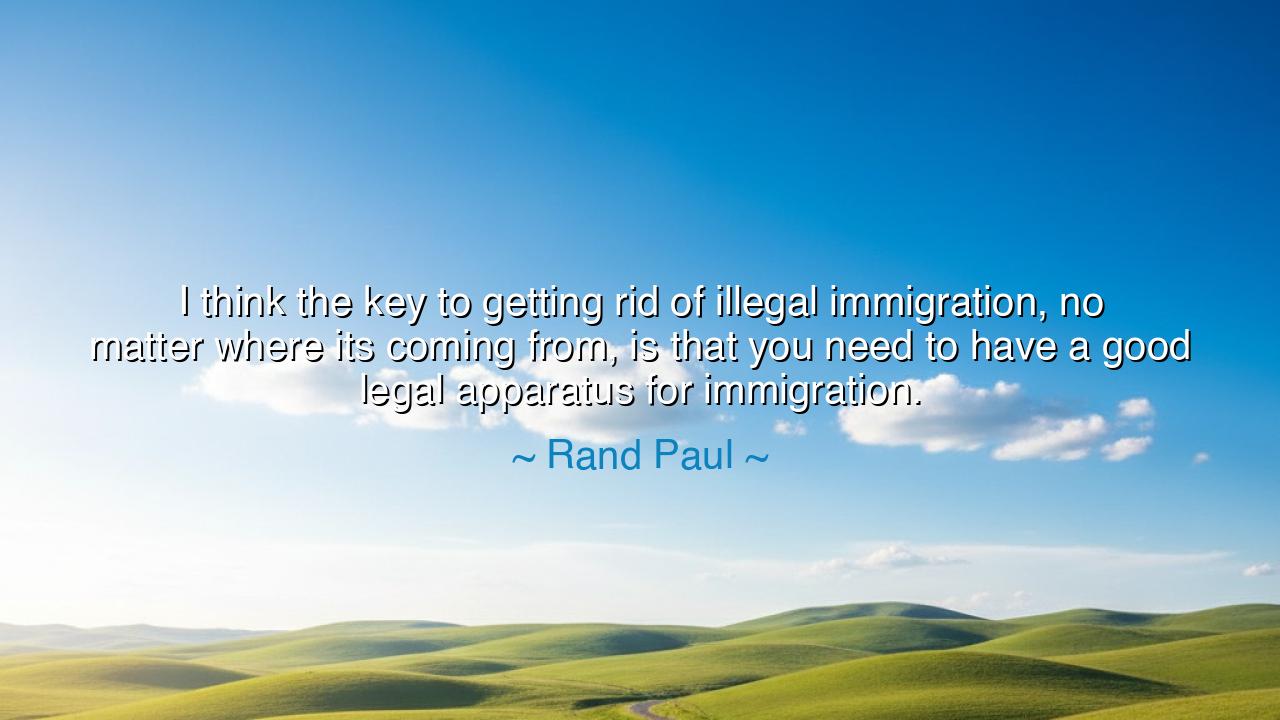
I think the key to getting rid of illegal immigration, no matter
I think the key to getting rid of illegal immigration, no matter where its coming from, is that you need to have a good legal apparatus for immigration.






Hearken, O seekers of wisdom, to the words of Rand Paul, who, contemplating the movement of peoples and the order of nations, declared: "I think the key to getting rid of illegal immigration, no matter where it is coming from, is that you need to have a good legal apparatus for immigration." In these words lies a profound meditation on law, order, and the careful balance between human freedom and societal stability. Paul reminds us that a society without structure risks chaos, while a society with fair and effective legal frameworks can channel human ambition and movement toward the common good.
Since the dawn of civilization, rulers and philosophers alike have understood that the governance of peoples demands both compassion and discipline. In the ancient city-states of Greece, those who sought entrance were welcomed only through measured procedures; in the courts of Rome, the granting of citizenship and residence was codified, for unregulated influx of strangers threatened the cohesion of the polis. Paul’s insight mirrors this ancient understanding: to regulate immigration effectively, one must create a legal apparatus that balances the rights of newcomers with the security and order of the community.
Consider the case of the United States itself, whose history is entwined with waves of migration. In the late 19th and early 20th centuries, millions crossed its shores, drawn by hope and opportunity. Yet the nation recognized the necessity of law: the establishment of Ellis Island, the implementation of health inspections, and the codification of entry procedures ensured that the movement of peoples did not destabilize the society they sought to join. Here we see the truth of Paul’s words: an effective legal apparatus channels human desire for freedom into a framework that preserves societal order while honoring opportunity.
Yet the challenge is timeless. Without enforcement, laws are empty; without clarity, rules become confusion. Illegal immigration arises not merely from human need or ambition, but from gaps in governance, from weaknesses in the structures that mediate the relations between those who seek entry and those who must sustain order. Paul’s statement teaches that the key is foresight: to build a system robust enough to address movement of peoples, adaptable enough to account for circumstance, and just enough to honor both law and human dignity.
History furnishes stark lessons. In medieval Europe, the uncontrolled movement of populations during famines and wars led to unrest and strife. Those cities and kingdoms that instituted clear rules—regulating settlement, granting permission to work, and ensuring obligations to the community—prospered. Those that did not faced disorder and hardship. Paul’s reflection is rooted in this timeless lesson: orderly law is not oppression but protection, not barrier but channel for opportunity and stability.
From this reflection emerges a principle both practical and moral: society flourishes when movement is regulated by fairness, clarity, and enforcement. To address illegal immigration, it is not sufficient to punish or exclude; one must construct systems that are transparent, accessible, and anchored in the rule of law. The legal apparatus is both shield and guide, ensuring that those who come bear responsibility, that communities remain resilient, and that human ambition finds lawful expression.
O seekers of wisdom, let this teaching guide your actions. Whether in governance, community leadership, or personal life, recognize that structure and clarity are not hindrances to liberty but instruments of justice. Build systems that honor both rights and responsibilities, and understand that the proper channeling of human endeavor safeguards both freedom and order. Paul’s words remind us that foresight, law, and fairness are inseparable in the creation of durable societies.
Take this teaching into your daily life: uphold the rule of law, support systems that provide clarity and fairness, and recognize that responsibility and liberty walk together. Just as nations must cultivate effective legal apparatuses to manage immigration, so too must individuals cultivate structures of order, understanding, and accountability in their own affairs. In doing so, you honor the balance between freedom and responsibility, a balance as old as the ancients and as vital as the breath of life itself.






AAdministratorAdministrator
Welcome, honored guests. Please leave a comment, we will respond soon